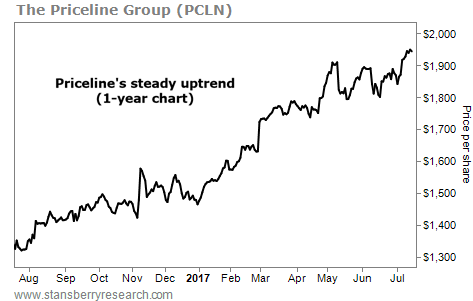| Home | About Us | Resources | Archive | Free Reports | Market Window |
Seven Questions to Ask Before You Invest in That IPOBy
Wednesday, July 19, 2017
At some point, your friendly local stockbroker may present you with the opportunity to invest in an initial public offering (IPO).
In an IPO, a company raises capital by selling shares to investors. When you buy a stock in the secondary market, you're buying it from another investor. But with an IPO, the cash you pay goes to the company.
You've probably heard about the IPOs that see a surge in the share price on the first day of trading. But that happens rarely – and it should not be a reason to invest in an IPO.
If you're looking at IPOs, it pays to ask these seven questions first...
The whole point of an IPO is to raise money. But who gets the cash? Sometimes it's the founding shareholders, who are usually management. If these insiders are selling, what does it say about the company's prospects? Nothing good. Of course, that's not entirely fair. The founding shareholders of a company may be looking to take some cash off the table after spending their time and money building the business. They may want to diversify their assets – or maybe buy a yacht.
However, it's much more encouraging if the proceeds are used for the company's further development and expansion. And in any case, the founding shareholders should hold on to a significant stake so that they still have skin in the game.
A company may sell shares because it needs funding to grow... Or company insiders may believe they're selling at a point of maximum optimism, which means they'll get a better price (from a valuation perspective). Like everyone else, the sellers want to "sell high." Meanwhile, investors buying into an IPO are trying to "buy low," betting that the company's growth prospects are still strong. Who knows best? The danger of being wrong is that you buy an offering when the company is firing on all cylinders and things can't get any better... in which case, they can only get worse.
If it isn't, let's face it: You're not investing – you're speculating. That doesn't mean you shouldn't buy shares, but it does suggest that the offering is riskier. And you should account for that higher level of risk accordingly.
The shareholders who are selling want to sell at a high valuation level (based on measures like the price-to-earnings ratio, for example). Investors buying into the IPO, meanwhile, want a low valuation so that the share price has room to rise. The big question – as with any valuation exercise – is what the stock price is being compared with. The people selling the IPO will point to companies that trade at high valuations – so that the shares they are selling will appear cheap by comparison. The shares of companies that are direct competitors in the same country and sector, with a similar growth rate, are generally the best ones to look at.
Most brokers tend to save their IPO allocations for their "favored clients" – customers who trade with large sums of money. So underwriters and "big investors" tend to have the first bite... And individual investors are often left with the table scraps, or with the shares of a dud offering. To paraphrase Groucho Marx, would you want to buy shares of a company that has shares available to sell to you?
Not long ago, investment banks made a killing on IPOs. They could earn around 7% of total proceeds, though that could vary according to the size of the deal. In effect, that meant investors were only getting $0.93 of value for every dollar they invested. Thankfully for investors, that's all in the past. Today, fees are a lot more reasonable. But keep in mind that your broker will stand to make a lot more by selling you shares of an IPO than by selling you a stock that's already trading.
Traditionally, when companies issue equity to shareholders, those shares come with voting rights. "One share, one vote" used to be the conventional wisdom. But that is now changing, especially in the technology space. The most outrageous recent example occurred earlier this year with the IPO of social-media company Snap (SNAP). In that case, new investors bought shares with absolutely no voting rights whatsoever. In fact, Snap's 27-year-old founders control nearly 90% of the company.
As an investor, you need to ask yourself if you are comfortable with companies taking investor money, but not giving investors any say in how the company is operated.
If you're looking at investing in an IPO, get answers to these questions first. And remember, if it sounds too good to be true... it probably is.
Good investing,
Kim Iskyan
Further Reading:
As Kim explained today, it's crucial to consider fees before you invest. "We're in the midst of a low-cost fund revolution," Porter Stansberry writes. But a large gap exists between two major types of funds... And it could be costing you thousands. Learn more here.
Dr. David Eifrig shares the core question you must ask before investing. "Whether you're loaning money to friends or family, acquiring land, purchasing gold coins, or buying a stock," he writes, it's a sure way to boost your investing success. Read more here.
Market NotesTHIS TRAVEL GIANT IS SOARING Today's chart highlights the strength of the travel industry...
May was another good month for travel. U.S. travel rose more than 3% in May versus the same period in 2016. That marked the 89th straight month of expansion for the industry – a span of more than seven years. As you might expect, travel and booking companies are benefiting from this trend. And the largest of these, The Priceline Group (PCLN), is no different...
The $97 billion firm owns and operates travel websites such as Booking.com, Priceline.com, and Rentalcars.com. Priceline also acquired restaurant-reservation service OpenTable a few years ago. In short, it's the go-to company for travel and dining reservations. And lots of people are using its services...
Last quarter, Priceline reported its total bookings jumped 24% from the same time last year. And as you can see below, PCLN shares have soared. They're up nearly 50% over the past 12 months and just hit a new all-time high. As long as people keep making travel and dinner plans, Priceline will continue to reap the benefits...
 |
Recent Articles
|



